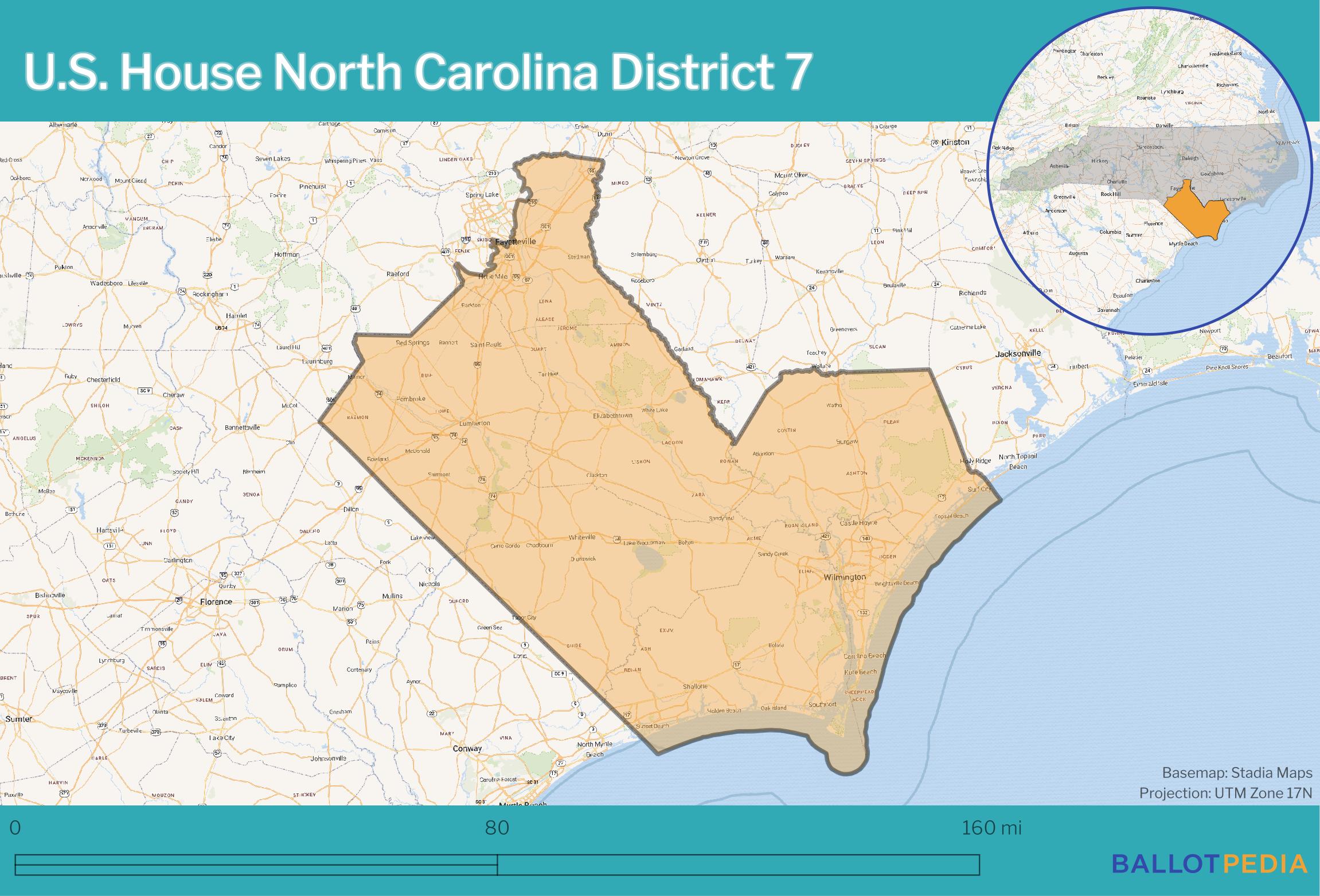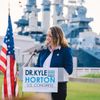North Carolina's 7th Congressional District election, 2024
2026 →
← 2022
|
| North Carolina's 7th Congressional District |
|---|
| Democratic primary Republican primary General election |
| Election details |
| Filing deadline: December 15, 2023 |
| Primary: March 5, 2024 Primary runoff: May 14, 2024 General: November 5, 2024 |
| How to vote |
| Poll times: 6:30 a.m. to 7:30 p.m. Voting in North Carolina |
| Race ratings |
DDHQ and The Hill: Safe Republican Inside Elections: Solid Republican Sabato's Crystal Ball: Safe Republican |
| Ballotpedia analysis |
| U.S. Senate battlegrounds U.S. House battlegrounds Federal and state primary competitiveness Ballotpedia's Election Analysis Hub, 2024 |
| See also |
1st • 2nd • 3rd • 4th • 5th • 6th • 7th • 8th • 9th • 10th • 11th • 12th • 13th • 14th North Carolina elections, 2024 U.S. Congress elections, 2024 U.S. Senate elections, 2024 U.S. House elections, 2024 |
All U.S. House districts, including the 7th Congressional District of North Carolina, held elections in 2024. The general election was November 5, 2024. The primary was March 5, 2024, and a primary runoff was May 14, 2024. The filing deadline was December 15, 2023.
The outcome of this race affected the partisan balance of the U.S. House of Representatives in the 119th Congress. All 435 House districts were up for election.
At the time of the election, Republicans held a 220-212 majority with three vacancies.[1] As a result of the election, Republicans retained control of the U.S. House, winning 220 seats to Democrats' 215.[2] To read more about the 2024 U.S. House elections, click here.
In the 2022 election in this district, the Republican candidate won 57.7%-42.3%. Daily Kos calculated what the results of the 2020 presidential election in this district would have been following redistricting. Donald Trump (R) would have defeated Joe Biden (D) 54.9%-43.9%.[3]
North Carolina conducted redistricting between the 2022 and 2024 elections. As a result, district lines in this state changed. To review how redistricting took place in North Carolina and to see maps of the new districts, click here. For a list of all states that drew new district lines between 2022 and 2024, click here.
For more information about the primaries in this election, click on the links below:
- North Carolina's 7th Congressional District election, 2024 (March 5 Democratic primary)
- North Carolina's 7th Congressional District election, 2024 (March 5 Republican primary)
Candidates and election results
General election
General election for U.S. House North Carolina District 7
Incumbent David Rouzer defeated Marlando Pridgen in the general election for U.S. House North Carolina District 7 on November 5, 2024.
Candidate | % | Votes | ||
| ✔ |  | David Rouzer (R) | 58.6 | 254,022 |
 | Marlando Pridgen (D)  | 41.4 | 179,512 | |
| Total votes: 433,534 | ||||
 = candidate completed the Ballotpedia Candidate Connection survey. = candidate completed the Ballotpedia Candidate Connection survey. | ||||
| If you are a candidate and would like to tell readers and voters more about why they should vote for you, complete the Ballotpedia Candidate Connection Survey. | ||||
Do you want a spreadsheet of this type of data? Contact our sales team. | ||||
Democratic primary election
The Democratic primary election was canceled. Marlando Pridgen advanced from the Democratic primary for U.S. House North Carolina District 7.
Republican primary election
The Republican primary election was canceled. Incumbent David Rouzer advanced from the Republican primary for U.S. House North Carolina District 7.
Candidate profiles
This section includes candidate profiles that may be created in one of two ways: either the candidate completed Ballotpedia's Candidate Connection survey, or Ballotpedia staff may compile a profile based on campaign websites, advertisements, and public statements after identifying the candidate as noteworthy. For more on how we select candidates to include, click here.

Party: Democratic Party
Incumbent: No
Submitted Biography: "Marlando D. Pridgen, a fresh face in grassroots advocacy and community leadership, is stepping forward as a candidate for NC Congressional District 7. Born and raised in scenic Southeastern North Carolina, Pridgen’s early life was shaped by the values of hard work, community service, and integrity. His environment shaped his life's mission: to dedicate himself to helping and serving others. As he steps into the political arena, Pridgen brings these foundational principles and a commitment to represent the voices of his community. Pridgen's approach to politics is grounded in listening to the needs of his constituents and advocating for policies that promote economic growth, healthcare accessibility, and environmental sustainability. His campaign emphasizes inclusivity, transparency, and accountability, aiming to bridge the gap between the government and the people. As a congressional candidate, Marlando Pridgen is committed to being a voice for his community, striving to bring about legislative changes that will benefit NC Congressional District 7 and the nation as a whole. His vision is to create a more equitable and prosperous future for all citizens, guided by the principles of justice, fairness, and community collaboration."
![]()
This information was current as of the candidate's run for U.S. House North Carolina District 7 in 2024.
Voting information
- See also: Voting in North Carolina
Ballotpedia's Candidate Connection survey responses
Ballotpedia asks all federal, state, and local candidates to complete a survey and share what motivates them on political and personal levels. The section below shows responses from candidates in this race who completed Ballotpedia's Candidate Connection survey. Candidates are asked three required questions for this survey, but they may answer additional optional questions as well.

Survey responses from candidates in this race
Click on a candidate's name to visit their Ballotpedia page.
Note: Ballotpedia reserves the right to edit Candidate Connection survey responses. Any edits made by Ballotpedia will be clearly marked with [brackets] for the public. If the candidate disagrees with an edit, he or she may request the full removal of the survey response from Ballotpedia.org. Ballotpedia does not edit or correct typographical errors unless the candidate's campaign requests it.
| Collapse all

Marlando Pridgen (D)
Commitment to Healthcare Accessibility: Understanding the critical importance of healthcare, Marlando Pridgen is committed to working towards more accessible and affordable healthcare solutions for all constituents. He believes in the need for a healthcare system that is both comprehensive and compassionate, ensuring that no resident of District 7 is left behind. Pridgen advocates for policies that will lower healthcare costs, expand coverage, and improve the quality of healthcare services, making sure that families can receive the care they need without financial strain.
Champion for Education and Skills Training: Recognizing education as the cornerstone of personal and community development, Marlando Pridgen is dedicated to advancing educational opportunities and skills training programs. He aims to support public education from K-12 to higher education, ensuring that schools are well-funded and teachers are well-supported. Pridgen's vision includes accessible vocational training and continuous education programs that equip the workforce with the skills necessary to thrive in the evolving job market. By investing in education, Pridgen believes District 7 can lay the foundation for a prosperous future.

Marlando Pridgen (D)
Pridgen's advocacy includes supporting reforms in healthcare legislation, pushing for the expansion of Medicaid, or introducing new initiatives to make healthcare more equitable.
Pridgen will work towards increasing funding for schools, supporting teacher pay raises, and creating more opportunities for skills training that aligns with the needs of the modern workforce.
Marlando Pridgen (D)

Marlando Pridgen (D)

Marlando Pridgen (D)
Integrity is foundational. An elected official with integrity stands by their principles, keeps their promises, and remains transparent in their actions and decisions.
Accountability is paramount. Officials must own their decisions and actions, including mistakes. This involves openness to scrutiny, willingness to explain and justify actions, and a readiness to make amends when necessary.
Empathy and compassion allow officials to understand diverse constituent needs and challenges, enabling informed, considerate decisions, especially for the most vulnerable.
Inspiring and uniting people towards common goals, making tough calls, and navigating complex political landscapes require effective leadership. This also demands humility and a willingness to listen and learn.
Clear, honest, and open communication builds trust and understanding between officials and constituents. It involves not just conveying information effectively but actively listening to concerns and feedback.
Having a clear vision for the future and adeptly addressing current issues with innovative solutions is crucial. Officials must be forward-thinking problem-solvers, working towards community and societal betterment.
Resilience and persistence are necessary to navigate political pressures, overcome obstacles, and strive for positive change despite adversity or opposition.
A commitment to promoting fairness, justice, and equity is vital. This means advocating for policies and actions that address inequalities, ensuring all individuals can thrive.
Adaptability is key. Effective officials must be flexible, willing to adjust strategies, policies, and plans as needed to better serve constituents in changing circumstances and with new information.
Marlando Pridgen (D)
Legislation: Crafting, sponsoring, and voting on bills and legislation is a primary responsibility.
Representation: Elected officials are expected to advocate for district priorities, securing funding for local projects, and ensuring that the policies enacted at the federal level benefit their constituents.
Constituent Services: Ensuring that constituents' needs and concerns are addressed.
Oversight: Participating in hearings, investigations, and audits. Oversight is crucial for maintaining transparency, accountability, and effectiveness in government operations.
Policy and Advocacy: Elected officials must engage in policy analysis and advocacy, working on committees and with various stakeholders to shape public policy in areas such as healthcare, education, national security, the economy, and more.
Informing the Public: Keeping constituents informed about legislative developments, policy issues, and the official's stances through town hall meetings, newsletters, social media, and other forms of communication.
Collaboration and Negotiation: Building relationships with other lawmakers, stakeholders, and interest groups is vital for achieving legislative goals which includes collaborating across party lines, negotiating compromises, and working in committees to advance legislation.
Ethical Leadership: Upholding the highest ethical standards and demonstrating integrity, fairness, and respect in all actions. Elected officials should serve as role models, exhibiting conduct that reflects well on their office and promotes public trust in the democratic process.
Marlando Pridgen (D)
House members' two-year terms, the shortest federal office, keep them closely tied to constituent interests and public opinion shifts. The House's exclusive right to initiate revenue bills aligns with being the chamber most directly connected to the people on financial matters affecting them.
The House's sole authority to impeach federal officials is a critical check on the executive and judicial branches. Its detailed committee system allows division of labor and specialized focus across subjects from agriculture to security. Committees draft, amend, and initially vote on bills before full House debate.
Complex House rules and procedures govern the legislative process. The Rules Committee determines terms for considering legislation. This structured approach manages the extensive workload and maintains order during debates.
House leadership like the Speaker significantly influences the legislative agenda and priorities. The Speaker decides which bills get votes.
The House has grown increasingly diverse over time, including representatives across backgrounds, professions, and demographics - contributing a multiplicity of perspectives to policymaking.
These qualities make the House a dynamic, vital component adapting to the changing American populace while maintaining structured legislative processes. Its population-based representation ensures the will of the majority public is reflected, a hallmark of the democratic system.
Marlando Pridgen (D)
Representatives coming directly from private sector careers may have a closer connection to the day-to-day realities and challenges facing the people they aim to serve. This grounding in their constituents' lived experiences can help ensure the legislative process remains centered on addressing real needs rather than becoming divorced from the public's concerns.
Perhaps seeing individuals from diverse backgrounds successfully transition into political roles can inspire greater engagement from the public. When the halls of power reflect the full fabric of American society, more citizens from all walks of life feel represented and empowered to participate - whether through voting, activism, or potentially seeking office themselves one day.
While political experience is valuable, it is not the sole prerequisite for responsible and effective representation. The House of Representatives is intended to be a close reflection of the nation's populace. Incorporating a wide range of backgrounds and real-world experiences enriches the deliberative process and ensures policymaking remains grounded in the needs of all Americans.
Marlando Pridgen (D)
Economic inequality continues to widen, threatening stability and social cohesion. Creating more equitable opportunities for wealth and education is imperative to address this growing disparity. The COVID-19 pandemic exposed vulnerabilities in the healthcare system, including accessibility, affordability, and preparedness challenges.
Climate change poses an imminent threat, with disasters becoming more frequent and severe.
Rapid technological advancements, such as artificial intelligence and automation, are transforming the job market. The nation must foster a workforce that is adaptable, skilled, and prepared for the future of work.
The movement for racial justice has highlighted systemic inequalities, demanding comprehensive reforms in policing, criminal justice, education, and other areas to ensure equity and fairness for all Americans.
National security and global leadership face evolving threats, including cybersecurity attacks, terrorism, and the rise of global competitors. Maintaining a balanced approach to foreign policy and defense while nurturing alliances and addressing root causes of conflict is crucial.
Ensuring a robust, equitable, and adaptable education system that prepares future generations is another significant challenge, encompassing K-12, higher education, and vocational training.
Immigration reform is essential, addressing humanitarian and economic aspects through a balanced approach that secures borders while providing a pathway for legal immigration and addressing the status of undocumented immigrants.
These challenges demand collaborative efforts and innovative solutions.
Marlando Pridgen (D)
Beyond accountability to voters, two-year terms also allow the House to nimbly shift its focus and legislative agenda alongside changes in the political landscape and national priorities. As new issues and concerns emerge, the makeup and direction of the House can rapidly evolve to meet those developing needs through each election cycle.
However, these short terms create challenges as well. The perpetual need to fundraise and campaign can distract representatives from fully focusing on their governance duties and legislating. There is a risk that re-election efforts will take precedence over effective policymaking. Additionally, with their limited window before facing voters again, representatives may be incentivized to pursue short-term populist measures rather than long-term solutions requiring patience to bear fruit.
High turnover from frequent elections raises concerns about political instability as well. A lack of continuity in the House's makeup could undermine major long-term legislative projects and create inconsistencies in policymaking from one Congress to the next.
Ultimately, the two-year House term reflects a balance struck by the framers of the Constitution between ensuring proper responsiveness to the public will and allowing for a reasonably stable and effective governing body.
Marlando Pridgen (D)
One perspective is that term limits can restrict the ability of voters to reelect representatives they believe are performing well. This can be seen as undemocratic, as it limits the choice available to the electorate.
On the other hand, term limits are seen as a way to curb the power of career politicians and encourage elected officials to focus on serving the public interest, rather than concentrating on reelection efforts.
Both arguments are valid, but requires additional discussion to solidify thoughts on this debate.
Marlando Pridgen (D)

Marlando Pridgen (D)
Many policy matters are complex; compromise yields nuanced solutions better reflecting this complexity, versus simplistic approaches ignoring key aspects. When officials demonstrate willingness to work across party lines through compromise, it can enhance public trust that the focus is the public good, not partisan interests.
However, compromise must not sacrifice core principles or lead to inadequate solutions for critical issues. Finding the right balance between upholding values and openness to compromise is crucial for effective policymaking. Compromise harnesses diverse viewpoints for progress while preventing minority interests being steamrolled.
Marlando Pridgen (D)

Marlando Pridgen (D)
Foremost, the House's investigative authority should be utilized to hold public officials and agencies accountable for their actions. By probing allegations of misconduct, corruption, or dereliction of duty, the House can safeguard the integrity of government and ensure that those in power act in the nation's best interest.
Moreover, investigations can shed light on gaps in existing laws or areas where new regulations are needed. By thoroughly examining complex issues, the House can gather vital information to craft comprehensive and effective legislation that addresses the nation's evolving needs and challenges.
Protecting the public's well-being is another crucial application of the House's investigative powers. Inquiries into matters such as public health crises, environmental disasters, financial malpractices, and national security threats can pave the way for reforms and policies that safeguard the public from harm and promote the nation's welfare.
Transparency is a cornerstone of democracy, and investigations can play a pivotal role in bringing to light information of public interest that might otherwise remain hidden. Public hearings and published findings can foster transparency in government operations, thereby bolstering public trust and confidence in democratic institutions.
Finally, investigations can serve an educational role, providing both lawmakers and the public with in-depth knowledge about complex issues. Public hearings and reports can foster informed decision-making and enrich public discourse, essential elements of a robust democracy.
Marlando Pridgen (D)

Marlando Pridgen (D)
Campaign finance
| Name | Party | Receipts* | Disbursements** | Cash on hand | Date |
|---|---|---|---|---|---|
| David Rouzer | Republican Party | $1,784,470 | $1,965,224 | $1,435,526 | As of December 31, 2024 |
| Marlando Pridgen | Democratic Party | $0 | $0 | $0 | Data not available*** |
|
Source: Federal Elections Commission, "Campaign finance data," 2024. This product uses the openFEC API but is not endorsed or certified by the Federal Election Commission (FEC).
* According to the FEC, "Receipts are anything of value (money, goods, services or property) received by a political committee." |
|||||
General election race ratings
- See also: Race rating definitions and methods
Ballotpedia provides race ratings from four outlets: The Cook Political Report, Inside Elections, Sabato's Crystal Ball, and DDHQ/The Hill. Each race rating indicates if one party is perceived to have an advantage in the race and, if so, the degree of advantage:
- Safe and Solid ratings indicate that one party has a clear edge and the race is not competitive.
- Likely ratings indicate that one party has a clear edge, but an upset is possible.
- Lean ratings indicate that one party has a small edge, but the race is competitive.[4]
- Toss-up ratings indicate that neither party has an advantage.
Race ratings are informed by a number of factors, including polling, candidate quality, and election result history in the race's district or state.[5][6][7]
| Race ratings: North Carolina's 7th Congressional District election, 2024 | |||||||||
|---|---|---|---|---|---|---|---|---|---|
| Race tracker | Race ratings | ||||||||
| November 5, 2024 | October 29, 2024 | October 22, 2024 | October 15, 2024 | ||||||
| The Cook Political Report with Amy Walter | Solid Republican | Solid Republican | Solid Republican | Solid Republican | |||||
| Decision Desk HQ and The Hill | Safe Republican | Safe Republican | Safe Republican | Safe Republican | |||||
| Inside Elections with Nathan L. Gonzales | Solid Republican | Solid Republican | Solid Republican | Solid Republican | |||||
| Larry J. Sabato's Crystal Ball | Safe Republican | Safe Republican | Safe Republican | Safe Republican | |||||
| Note: Ballotpedia reviews external race ratings every week throughout the election season and posts weekly updates even if the media outlets have not revised their ratings during that week. | |||||||||
Ballot access
The table below details filing requirements for U.S. House candidates in North Carolina in the 2024 election cycle. For additional information on candidate ballot access requirements in North Carolina, click here.
| Filing requirements for U.S. House candidates, 2024 | ||||||
|---|---|---|---|---|---|---|
| State | Office | Party | Signatures required | Filing fee | Filing deadline | Source |
| North Carolina | U.S. House | Ballot-qualified party | 5% of registered voters in the same party or 8,000, whichever is greater[8] | $1,740.00 | 12/15/2023 | Source |
| North Carolina | U.S. House | Unaffiliated | 10,000[9] | $1,740.00 | 3/5/2024 | Source |
District analysis
Click the tabs below to view information about voter composition, past elections, and demographics in both the district and the state.
- District map - A map of the district before and after redistricting ahead of the 2024 election.
- Competitiveness - Information about the competitiveness of 2024 U.S. House elections in the state.
- Presidential elections - Information about presidential elections in the district and the state.
- State party control - The partisan makeup of the state's congressional delegation and state government.
Below is the district map used in the 2022 election next to the map in place for the 2024 election. Click on a map below to enlarge it.
2022

2024

This section contains data on U.S. House primary election competitiveness in North Carolina.
| North Carolina U.S. House competitiveness, 2014-2024 | ||||||||||||||
|---|---|---|---|---|---|---|---|---|---|---|---|---|---|---|
| Office | Districts/ offices |
Seats | Open seats | Candidates | Possible primaries | Contested Democratic primaries | Contested Republican primaries | % of contested primaries | Incumbents in contested primaries | % of incumbents in contested primaries | ||||
| 2024 | 14 | 14 | 5 | 64 | 28 | 2 | 11 | 46.4% | 4 | 44.4% | ||||
| 2022 | 14 | 14 | 4 | 100 | 28 | 9 | 13 | 78.6% | 7 | 70.0% | ||||
| 2020 | 13 | 13 | 3 | 64 | 26 | 8 | 5 | 50.0% | 3 | 30.0% | ||||
| 2018 | 13 | 13 | 0 | 56 | 26 | 10 | 7 | 65.4% | 8 | 61.5% | ||||
| 2016 | 13 | 13 | 1 | 74 | 26 | 6 | 10 | 61.5% | 9 | 75.0% | ||||
| 2014 | 13 | 13 | 3 | 60 | 26 | 8 | 9 | 65.4% | 6 | 60.0% | ||||
Post-filing deadline analysis
The following analysis covers all U.S. House districts up for election in North Carolina in 2024. Information below was calculated on 1/10/2024, and may differ from information shown in the table above due to candidate replacements and withdrawals after that time.
Sixty-four candidates filed to run for North Carolina’s 14 U.S. House districts in 2024, including 15 Democrats and 49 Republicans. That’s 4.6 candidates per district, less than the 7.14 candidates per district in 2022, the first election after the number of congressional districts in North Carolina increased from 13 to 14.
In 2020, when the state still had 13 Congressional districts, 4.9 candidates filed to run. In 2018, 4.3 candidates filed, and, in 2016, 5.7 did.
The 2024 election was the first to take place under new district lines that the North Carolina General Assembly adopted on October 25, 2023.
The 64 candidates who filed to run in 2024 were fewer than the 100 who ran in 2022. In 2020, 64 candidates also ran, although North Carolina had one fewer district then. Fifty-six candidates ran in 2018, the decade low.
Five seats were open in 2024, one more than in 2022 and a decade high.
Reps. Jeff Jackson (D-14th) and Dan Bishop (R-8th) did not run for re-election in order to run for state attorney general, while Rep. Patrick McHenry (R-10th) retired from public office. Reps. Kathy Manning (D-6th) and Wiley Nickel (D-13th), who did not run for re-election either, cited the partisan lean of their redrawn districts as the reason.
Fifteen candidates—one Democrat and 14 Republicans—ran for the open 13th district, the most candidates running for a seat in 2024. Thirteen primaries—two Democratic and 11 Republican—were contested. That was fewer than the 22 contested primaries in 2022, and tied with 2020 as the lowest number of contested primaries this decade. As a percentage of all possible primaries, the 13 contested primaries in 2024 were the lowest this decade (46%). North Carolina had 13 districts in 2020, making the 13 contested primaries that year 50% of all possible major party primaries.
Four incumbents—one Democrat and three Republicans—faced primary challengers. The 3rd and 6th Congressional districts were guaranteed to Republicans because no Democrats filed to run. Republicans filed to run in every congressional district, meaning none were guaranteed to Democrats.
Partisan Voter Index
Heading into the 2024 elections, based on results from the 2020 and 2016 presidential elections, the Cook Partisan Voter Index for this district was R+8. This meant that in those two presidential elections, this district's results were 8 percentage points more Republican than the national average. This made North Carolina's 7th the 161st most Republican district nationally.[10]
2020 presidential election results
The table below shows what the vote in the 2020 presidential election would have been in this district. The presidential election data was compiled by Daily Kos.
| 2020 presidential results in North Carolina's 7th based on 2024 district lines | ||||
|---|---|---|---|---|
| Joe Biden |
Donald Trump | |||
| 43.9% | 54.9% | |||
Inside Elections Baselines
- See also: Inside Elections
Inside Elections' Baseline is a figure that analyzes all federal and statewide election results from the district over the past four election cycles. The results are combined in an index estimating the strength of a typical Democratic or Republican candidate in the congressional district.[11] The table below displays the Baseline data for this district.
| Inside Elections Baseline for 2024 | ||||
|---|---|---|---|---|
| Democratic Baseline |
Republican Baseline |
Difference | ||
| 44.4 | 54.9 | R+10.5 | ||
Presidential voting history
North Carolina presidential election results (1900-2020)
- 18 Democratic wins
- 13 Republican wins
| Year | 1900 | 1904 | 1908 | 1912 | 1916 | 1920 | 1924 | 1928 | 1932 | 1936 | 1940 | 1944 | 1948 | 1952 | 1956 | 1960 | 1964 | 1968 | 1972 | 1976 | 1980 | 1984 | 1988 | 1992 | 1996 | 2000 | 2004 | 2008 | 2012 | 2016 | 2020 |
|---|---|---|---|---|---|---|---|---|---|---|---|---|---|---|---|---|---|---|---|---|---|---|---|---|---|---|---|---|---|---|---|
| Winning Party | D | D | D | D | D | D | D | R | D | D | D | D | D | D | D | D | D | R | R | D | R | R | R | R | R | R | R | D | R | R | R |
Congressional delegation
The table below displays the partisan composition of North Carolina's congressional delegation as of May 2024.
| Congressional Partisan Breakdown from North Carolina | |||
|---|---|---|---|
| Party | U.S. Senate | U.S. House | Total |
| Democratic | 0 | 4 | 4 |
| Republican | 2 | 10 | 12 |
| Independent | 0 | 0 | 0 |
| Vacancies | 0 | 0 | 0 |
| Total | 2 | 14 | 16 |
State executive
The table below displays the officeholders in North Carolina's top four state executive offices as of May 2024.
| State executive officials in North Carolina, May 2024 | |
|---|---|
| Office | Officeholder |
| Governor | |
| Lieutenant Governor | |
| Secretary of State | |
| Attorney General | |
State legislature
North Carolina State Senate
| Party | As of February 2024 | |
|---|---|---|
| Democratic Party | 20 | |
| Republican Party | 30 | |
| Other | 0 | |
| Vacancies | 0 | |
| Total | 50 | |
North Carolina House of Representatives
| Party | As of February 2024 | |
|---|---|---|
| Democratic Party | 48 | |
| Republican Party | 72 | |
| Other | 0 | |
| Vacancies | 0 | |
| Total | 120 | |
Trifecta control
The table below shows the state's trifecta status from 1992 until the 2024 election.
North Carolina Party Control: 1992-2024
Fourteen years of Democratic trifectas • Four years of Republican trifectas
Scroll left and right on the table below to view more years.
| Year | 92 | 93 | 94 | 95 | 96 | 97 | 98 | 99 | 00 | 01 | 02 | 03 | 04 | 05 | 06 | 07 | 08 | 09 | 10 | 11 | 12 | 13 | 14 | 15 | 16 | 17 | 18 | 19 | 20 | 21 | 22 | 23 | 24 |
|---|---|---|---|---|---|---|---|---|---|---|---|---|---|---|---|---|---|---|---|---|---|---|---|---|---|---|---|---|---|---|---|---|---|
| Governor | R | D | D | D | D | D | D | D | D | D | D | D | D | D | D | D | D | D | D | D | D | R | R | R | R | D | D | D | D | D | D | D | D |
| Senate | D | D | D | D | D | D | D | D | D | D | D | D | D | D | D | D | D | D | D | R | R | R | R | R | R | R | R | R | R | R | R | R | R |
| House | D | D | D | R | R | R | R | D | D | D | D | D | D | D | D | D | D | D | D | R | R | R | R | R | R | R | R | R | R | R | R | R | R |
District history
The section below details election results for this office in elections dating back to 2018.
General election
General election for U.S. House North Carolina District 7
Incumbent David Rouzer (R) defeated Charles Graham (D) in the general election for U.S. House North Carolina District 7 on November 8, 2022.
Candidate | % | Votes | ||
| ✔ |  | David Rouzer (R) | 57.7 | 164,047 |
 | Charles Graham (D) | 42.3 | 120,222 | |
| Total votes: 284,269 | ||||
 = candidate completed the Ballotpedia Candidate Connection survey. = candidate completed the Ballotpedia Candidate Connection survey. | ||||
| If you are a candidate and would like to tell readers and voters more about why they should vote for you, complete the Ballotpedia Candidate Connection Survey. | ||||
Do you want a spreadsheet of this type of data? Contact our sales team. | ||||
Withdrawn or disqualified candidates
- David Thompson (Independent)
Democratic primary
Democratic primary for U.S. House North Carolina District 7
Charles Graham (D) defeated Charles E. Evans (D), Steve Miller (D), and Yushonda Midgette (D) in the Democratic primary for U.S. House North Carolina District 7 on May 17, 2022.
Candidate | % | Votes | ||
| ✔ |  | Charles Graham | 31.2 | 13,054 |
 | Charles E. Evans | 29.3 | 12,263 | |
 | Steve Miller  | 23.3 | 9,744 | |
 | Yushonda Midgette | 16.1 | 6,738 | |
| Total votes: 41,799 | ||||
 = candidate completed the Ballotpedia Candidate Connection survey. = candidate completed the Ballotpedia Candidate Connection survey. | ||||
| If you are a candidate and would like to tell readers and voters more about why they should vote for you, complete the Ballotpedia Candidate Connection Survey. | ||||
Do you want a spreadsheet of this type of data? Contact our sales team. | ||||
Withdrawn or disqualified candidates
Republican primary
Republican primary for U.S. House North Carolina District 7
Incumbent David Rouzer (R) defeated Max Beckwith (R) in the Republican primary for U.S. House North Carolina District 7 on May 17, 2022.
Candidate | % | Votes | ||
| ✔ |  | David Rouzer | 79.2 | 39,203 |
 | Max Beckwith  | 20.8 | 10,300 | |
| Total votes: 49,503 | ||||
 = candidate completed the Ballotpedia Candidate Connection survey. = candidate completed the Ballotpedia Candidate Connection survey. | ||||
| If you are a candidate and would like to tell readers and voters more about why they should vote for you, complete the Ballotpedia Candidate Connection Survey. | ||||
Do you want a spreadsheet of this type of data? Contact our sales team. | ||||
Withdrawn or disqualified candidates
- Peter Boykin (R)
General election
General election for U.S. House North Carolina District 7
Incumbent David Rouzer (R) defeated Christopher Ward (D) and Theresa Everett (Independent) in the general election for U.S. House North Carolina District 7 on November 3, 2020.
Candidate | % | Votes | ||
| ✔ |  | David Rouzer (R) | 60.2 | 272,443 |
 | Christopher Ward (D)  | 39.6 | 179,045 | |
 | Theresa Everett (Independent) (Write-in)  | 0.1 | 294 | |
| Other/Write-in votes | 0.1% | 426 | ||
| Total votes: 452,208 | ||||
 = candidate completed the Ballotpedia Candidate Connection survey. = candidate completed the Ballotpedia Candidate Connection survey. | ||||
| If you are a candidate and would like to tell readers and voters more about why they should vote for you, complete the Ballotpedia Candidate Connection Survey. | ||||
Do you want a spreadsheet of this type of data? Contact our sales team. | ||||
Democratic primary
Democratic primary for U.S. House North Carolina District 7
Christopher Ward (D) defeated Mark Judson (D) and Robert Colon (D) in the Democratic primary for U.S. House North Carolina District 7 on March 3, 2020.
Candidate | % | Votes | ||
| ✔ |  | Christopher Ward  | 46.3 | 35,224 |
 | Mark Judson  | 36.3 | 27,640 | |
 | Robert Colon | 17.3 | 13,183 | |
| Total votes: 76,047 | ||||
 = candidate completed the Ballotpedia Candidate Connection survey. = candidate completed the Ballotpedia Candidate Connection survey. | ||||
| If you are a candidate and would like to tell readers and voters more about why they should vote for you, complete the Ballotpedia Candidate Connection Survey. | ||||
Do you want a spreadsheet of this type of data? Contact our sales team. | ||||
Republican primary
The Republican primary scheduled for March 3, 2020, was canceled. Incumbent David Rouzer (R) advanced from the Republican primary for U.S. House North Carolina District 7 without appearing on the ballot.
Withdrawn or disqualified candidates
- Pete D'Abrosca (R)
General election
General election for U.S. House North Carolina District 7
Incumbent David Rouzer (R) defeated Kyle Horton (D) and David Fallin (Constitution Party) in the general election for U.S. House North Carolina District 7 on November 6, 2018.
Candidate | % | Votes | ||
| ✔ |  | David Rouzer (R) | 55.5 | 156,809 |
 | Kyle Horton (D) | 42.8 | 120,838 | |
| David Fallin (Constitution Party) | 1.7 | 4,665 | ||
| Total votes: 282,312 (100% precincts reporting) | ||||
 = candidate completed the Ballotpedia Candidate Connection survey. = candidate completed the Ballotpedia Candidate Connection survey. | ||||
| If you are a candidate and would like to tell readers and voters more about why they should vote for you, complete the Ballotpedia Candidate Connection Survey. | ||||
Do you want a spreadsheet of this type of data? Contact our sales team. | ||||
Democratic primary
Democratic primary for U.S. House North Carolina District 7
Kyle Horton (D) defeated Grayson Parker (D) in the Democratic primary for U.S. House North Carolina District 7 on May 8, 2018.
Candidate | % | Votes | ||
| ✔ |  | Kyle Horton | 67.0 | 21,499 |
 | Grayson Parker | 33.0 | 10,587 | |
| Total votes: 32,086 | ||||
 = candidate completed the Ballotpedia Candidate Connection survey. = candidate completed the Ballotpedia Candidate Connection survey. | ||||
| If you are a candidate and would like to tell readers and voters more about why they should vote for you, complete the Ballotpedia Candidate Connection Survey. | ||||
Do you want a spreadsheet of this type of data? Contact our sales team. | ||||
Republican primary
Republican primary for U.S. House North Carolina District 7
Incumbent David Rouzer (R) advanced from the Republican primary for U.S. House North Carolina District 7 on May 8, 2018.
Candidate | ||
| ✔ |  | David Rouzer |
 = candidate completed the Ballotpedia Candidate Connection survey. = candidate completed the Ballotpedia Candidate Connection survey. | ||||
| If you are a candidate and would like to tell readers and voters more about why they should vote for you, complete the Ballotpedia Candidate Connection Survey. | ||||
Do you want a spreadsheet of this type of data? Contact our sales team. | ||||
See also
External links
Footnotes
- ↑ A majority in the U.S. House when there are no vacancies is 218 seats.
- ↑ These figures include the seat of Rep. Matt Gaetz (R-Fla.), who resigned on Nov. 13, 2024, after winning re-election.
- ↑ Daily Kos, "Daily Kos Elections' 2020 presidential results by congressional district, for new and old districts," accessed September 15, 2022
- ↑ Inside Elections also uses Tilt ratings to indicate an even smaller advantage and greater competitiveness.
- ↑ Amee LaTour, "Email correspondence with Nathan Gonzalez," April 19, 2018
- ↑ Amee LaTour, "Email correspondence with Kyle Kondik," April 19, 2018
- ↑ Amee LaTour, "Email correspondence with Charlie Cook," April 22, 2018
- ↑ Petition signatures only required in lieu of filing fee.
- ↑ Petition signatures only required in lieu of filing fee.
- ↑ Cook Political Report, "The 2022 Cook Partisan Voting Index (Cook PVI℠)," accessed January 10, 2024
- ↑ Inside Elections, "Methodology: Inside Elections’ Baseline by Congressional District," December 8, 2023









